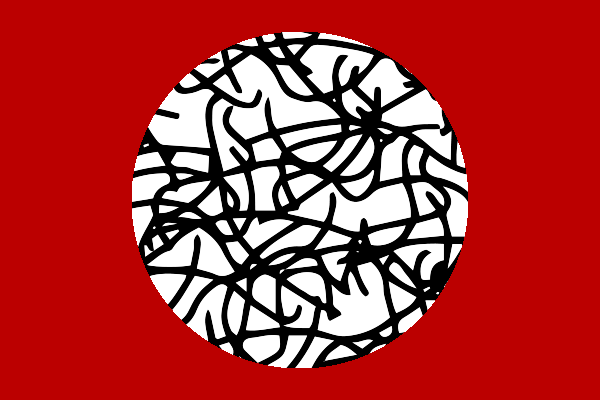A virtual coffee shop: A portrait of the artist in a pandemic

When Emerita Professor Katherine Burkman has an idea, she’s not going to waste any time getting it out into the world, pandemic or not. Which, in 2020, means that Burkman’s new musical, The Coffee Shop Blues: A Portrait of the Artist as a Middle-Aged Woman, written in collaboration with Department of English alum Stefan Farrenkopf and produced by Burkman’s company Wild Women Writing, will be premiering on Vimeo rather than in a live venue, as originally planned.

Coffee Shop Blues revolves around Calli, a happily married mother and grandmother who does what so many of us do in this age of social media: uses Facebook to check in on an old crush every once in a while. However, on this particular day in the coffee shop, Calli sees an unexpected update—her crush, an artist whom she met years before at summer camp, has died. This discovery sends Calli on a journey of reflection and self-discovery, joined by a bevy of mythological characters including the winged horse Pegasus, his companion Bellerophon and three gray sisters with one eye between them.
As fantastical as this story may sound, it’s largely autobiographical. Burkman was writing at a coffee shop one day a couple years ago and discovered that “her artist,” an old crush whom she had gotten over but still kept track of, had died. That artist, Irving Petlin, isn’t well known in the United States, but Burkman discovered as she read his obituary that he was considered “the greatest pastel artist in the world.” This discovery helped cement Burkman’s first thought after learning of his death: “I think I need to write about this.” And thus Coffee Shop Blues was born.
Some of the real-life influences are obvious after hearing Burkman’s story: the coffee shop, the artist, the stories of meeting at summer camp. But even the more extraordinary elements, including the mythological characters in the play, stem from Burkman’s life. While she wasn’t literally visited by a winged horse, or by three sisters sharing a single eye, the specific characters she chose to include were influenced by her time with Petlin: he made lithographs of the three gray women and of Bellerophon taming Pegasus for her (both of which hang on the wall behind her during our interview).
A Musical Collaboration
Burkman can’t quite remember when she decided to write the show as a musical, but one thing is clear: it wouldn’t have happened without composer and co-lyricist Stefan Farrenkopf. Farrenkopf was a student of Burkman’s at Ohio State, and a chance run-in a few years ago led to an unexpected collaboration. Burkman cast Farrenkopf in her 2017 piece A Riff on Hamlet, and he ended up composing music to underscore the piece. That collaboration seems to have led directly to Coffee Shop Blues, as Burkman told Farrenkopf shortly after A Riff on Hamlet that she was writing a musical. And, Farrenkopf notes with a laugh, “I knew that she didn’t write music. So I had a feeling I was getting roped in.” But his contributions went far beyond the music—both Burkman and Farrenkopf admit that Burkman herself is a poet, not a lyricist, so in addition to writing the music, Farrenkopf molded Burkman’s poetry into song lyrics. In fact, Burkman insists that Farrenkopf “really is a co-author, but he won’t admit it.” Farrenkopf thinks of himself as more of an editor: he points out that “[Burkman] had this idea, and it was her life, and she needed somebody else’s eyes to…come in and say, ‘Okay, what’s your story here, and let’s tell that story.’”
Farrenkopf also heavily influenced the musical style of the piece, which isn’t what you might think based on the title. Although Burkman originally wanted blues music, that’s not a genre Farrenkopf writes. He told her, “I’ll do the music, or you can have blues, but you can’t have me and the blues.” She chose him, and, while the title remains Coffee Shop Blues, the idea of “blues” has been cleverly reframed and redefined in the world of Burkman and Farrenkopf’s musical.
The Pandemic Shift
Burkman had planned to open Coffee Shop Blues in June, as a site-specific piece at The Chocolate Café. But then, in March 2020, the COVID-19 pandemic hit. While the team could have waited until live performances were safe again, they already had their cast in place, and, as Burkman said, “Why wait around for the pandemic to go away? …What am I going to do if I have to stay home?” The answer: create a recorded version of Coffee Shop Blues for audiences to enjoy from the comfort of their own living rooms.
Burkman’s son David, a filmmaker, offered to assist by instructing actors how to self-tape using their phones. He then edited the piece together, incorporating icons to represent items like a laptop or a coffee cup, adding backdrops of impressionistic art to convey a sense of place and weaving in the lithographs that Petlin had created for Burkman back at summer camp. The team certainly encountered challenges along the way—synchronizing dialogue with reactions, layering tracks of multiple people singing at the same time—but the end result is that Coffee Shop Blues has made its way into the world in 2020, in the face of hurdles that some may have viewed as insurmountable.
What’s Next for Coffee Shop Blues?
Burkman and Farrenkopf both hope to see the musical onstage one day; Burkman in particular “would like to see Pegasus fly.” But for now, you can see Coffee Shop Blues from the comfort of your own home! Tickets are available via EventBrite, and you’ll be able to watch the recording between December 1 and December 15.
